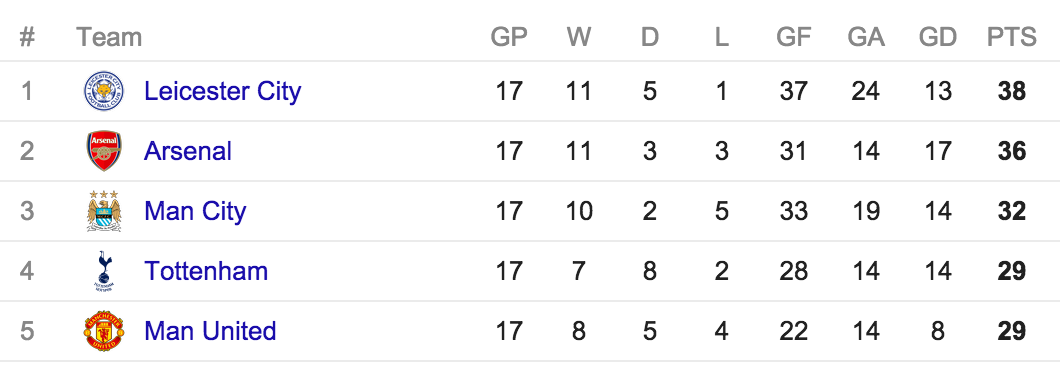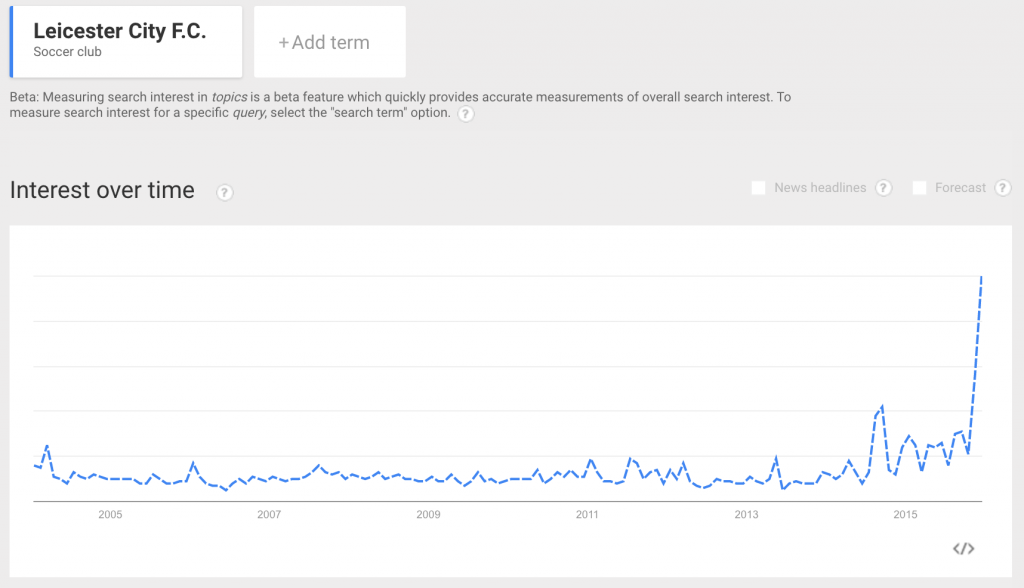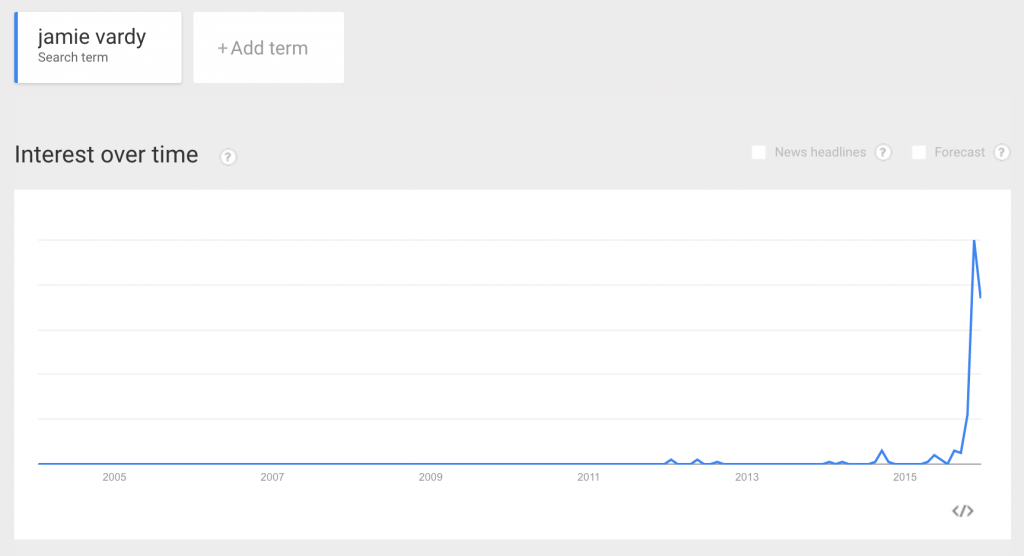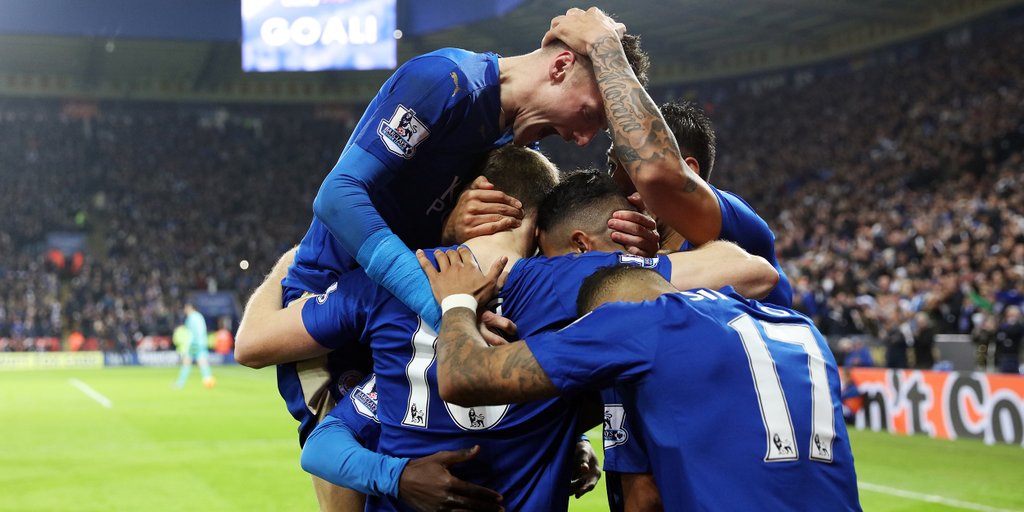 I think we can agree that fulfillment of potential is something we all yearn for.
I think we can agree that fulfillment of potential is something we all yearn for.
But what if the path to fulfillment is taken away from you? What then?
Well, compared to the rest of the world, American soccer is set up precisely to do this. Limit, or even take away, one’s potential.
Whether you are a player, a coach, a club, a community, or any active or would be active participant in the ecosystem, that is something you should be aware of.
This article is but one of what will be a never-ending series illustrating this. Never-ending, that is, until those responsible stop denying and obstructing merit-based opportunity for every constituent in the landscape.
Leicester City FC
We’ll start with Leicester because they are the current toast of global football in so far as highlighting opportunity, freedom, and fulfillment of potential.
Something intrinsic to the very reason it’s called ‘the beautiful game’.
Ok, so who is Leicester City?
Exactly!
A club, with a storied history, but in modern times no one really knew or talked about. Why? Because they weren’t competing in the the English top division – the Premier League.
For the past decade, they’ve been battling in obscurity in the 2nd division. Until they finally got their act together and won the division, thereby earning their promotion back to the major league.
Not only that, but 17 games into this season, they top the table.
In American soccer, Leicester City would still be in the 2nd division, indefinitely caste there, and the spike you see in the image below wouldn’t exist.

Being indefinitely caste in a lower division has insidious consequences.
- The club, an independent business with stakeholders, would remain in obscurity and not benefit from increased revenue modes that come with promotion.
- Its coach would remain in obscurity, his career would stall and not march ahead in tune with his merits and potential.
- Its players would remain in obscurity, their careers would stall and not march ahead in tune with their merits and potential.
And we can go on and on. The cascade effects are endless – the whole ecosystem becomes perverted, toxic, and corrupt.
But today, let’s focus on the 3rd point above – the players.

If earning promotion were prohibited in English football, no one would know who Jamie Vardy is, or what he can accomplish.
At 27, 27!, he had never played in the EPL.
His whole career had been in the lower divisions.
With his club having earned promotion, he’s getting his shot at proving what he can do at the top level.
And guess what?
Midway through this season, he’s the Premier League’s leading scorer.
Clearly he has the level to play in the top flight.
The wild thing to contemplate is this:
He’d still be a nobody, and his personal sporting, social, and economic potential would be stalled, if promotion & relegation did not exist.

How many top caliber American players are toiling in obscurity in our lower divisions?
A lot.
Now, before you start thinking Vardy is a crazy outlier, he’s not.
Every single year, in pretty much every single country around the globe, clubs are earning promotion, and their players are being exposed to the top level – with all the benefits that come from that opportunity.
Let’s continue with the Leicester roster.
Check this out:
This is Riyad Mahrez.
And yes, guess what, without promotion and relegation he’d continue being a nobody.
He too was in obscurity toiling in the French 2nd division, then moved to Leicester, helped the club get promoted, and now he’s in the big time.
He’s the 2nd leading scorer in the Premier League, behind teammate Vardy.
Clearly another player who has top flight level.
How many top flight Americans are invisible and can’t earn promotion through the success of their lower division clubs?
Again I repeat, these two cases are not outliers, the merit-based opportunity to fulfill one’s potential is commonplace every single year in every country across the globe with promotion and relegation.
You don’t have to be leading goal scorers to make the point.
One can look at the trajectory of the Leicester roster, and other countless ones across the globe, and come to appreciate what a merit-based club system does for the opportunity for fulfillment of player potential, at scale.
The current American system robs players of that.
We’ll leave the club, coach, fan, businessman, and community robbery – among more constituents – for another day.


Succinct & well written, Gary. I long for the day here in North America when we, too, will see the logic & benefits of pro/rel.
The truly sad part is that many of our great players never get to college and then they never get drafted, so they stay frozen in time after high school playing on some sub par Sunday Men’s team. In any other country the best play regardless of their level education.
Bravo Gary, bravo! Very hood research and informative piece. Just another reason of why athletes play their sport from infancy to adulthood, to one day make it to the top and be the best they can be :)! Every players dream! I did read an article about Vardy being racist in public towards an Asian individual calling him a “chink”, but that is a different story altogether and dies not take away from his soccer potential. Kudos to Mahrez as well, what a sweet left foot he has
Unfortunately pro/rel is easy to fix compared to the biggest player development killer in the U.S., namely college soccer. Did Jamie Vardy spend his high school years angling to get picked by a D! school? Between the ages of 18-22 was Jamie Vardy playing a 4 month season and not playing competitively the rest of the year? Nope, he was playing developing his game against men 12 months a year in competitive leagues while US boys are stopping their development at age 15. I don’t see the U.S. or its Fist Division pro league ever being on a par with the top 5 leagues in Europe, let alone Mexico because of the institution of college soccer.
If every club in the American pyramid (e.g., NASL, USL, PDL) had freedom to gain entrance into D1 simply based on performance, their ownership would do things (i.e., invest) to make that happen. It’s called the pursuit of glory, fame, and making money. That is the carrot all clubs seek. But unlike the franchise model, an open market has international potential. No MLS franchise can match the global superpower clubs. They “system” doesn’t enable it (e.g, salary caps, college, pay to play).
Let’s supposed USSF adopted pro/rel. If only one club (say LA Galaxy) went after the top international players, they would quickly dominate the league. Any challengers (let’s say NYFC) would have to do same, have better coaches, and/or develop better academy products. Probably all of above.
Once they did any of that, it would necessarily influence the product (i.e., players) that USSDA, college, pay to play produced. Producing better players requires better clubs and coaches and academies. If not, they would look internationally. College, USSDA and pay to play would quickly become irrelevant if they didn’t meet market demands.
Now if LA Galaxy and NYFC were dominating, other clubs would need to join the arms race for better players, coaches, academies, transfer market contracts. The next club could be from a lower division with ownership willing to invest. And from there you see where it’s leading you . . . .
This soccer arms race is what pro/rel enables. It’s exactly why Jamie Vardy or Riad Mahrez are in the headlines. It’s why Leicester’s ownership invested in Claudio Ranieri to coach them.
I believe whole heartedly in promotion and relegation as the highest expression of the game. I argue for it until the argument begins turning in a circle and eating itself almost– and I am left exasperated the way a parent is left exasperated staring at a child who just isn’t getting it. But lately in light of these feelings I have regarding the promotion relegation argument, and it is an argument, I am confronted with the likely possibility that no matter what — it may never take root which leads me to try and think of workable solutions with the model we have.
.
Generally the football pyramid works all over the world at least from a quality of play standard… but I have some questions and would like to play devil’s advocate for a moment.
.
Let’s say MLS 1 is the highest level of the game in the country. Let’s assume MLS grows to 40 odd teams over the 5-8 or 10 years. The league could either break off thereby forming a promotion relegation between the MLS i and MLS ii or it could be a large homogeneous league with one grand champion every year. Maybe it has conference championships that carry great weight and one, God forbid I say it, “Super Bowl” at the end of the season. basically an exact NFL replica.
.
Let’s assume USL continues to grow and each MLS team forms a AAA caliber USL affiliate. Let’s assume, the pressure becomes so great that NASL cannot be solvent and joins (which for the record I hope does not happen as I want NASL to grow to someday rival MLS and have it’s own pro/rel) MLS i or MLS ii. Let’s say at the grassroots level the game continues to grow in other markets at the host of other 3rd and 4th tier teams become feeders for the AAA and Major League club.
.
Is it possible…Gary, that soccer grows in this country in such a way that capitalizes both on the NFL and MLB structure? And if it does take this single entity shape, never truly opening itself to ANY Local Club FC with big aspirations and a vision, philosophy and plan of joining the highest ranks someday… can it work.
.
Can this model I write about which pretty inarguable has produced the highest levels of play in the world at the MLB and NFL level work? Can it produce a type of player that 1: is marketable around the world 2: is highly technical and tactically adept 3: has coaches demonstrating proficiency at a global standard level 4: built a youth system that is churning out quality players and most importantly 5: then informing a strong national identity, playing style and success at the international level.
.
I look forward to comments.
.
By the way… it goes without saying, I think 3four3 is cutting edge thinking and would like to state that either, the coaching membership is growing and the conversation has moved or more uninformed souls need to be led here to start from the beginning. I tell people ALL the time about this place and I am concerned based on the few posts more recently by the audience you are not getting the eyes we need you to be getting.
.
Could be a bit like AA… you take what you need and either are a Lifer or you move on with the new knowledge and start back at step 1 daily…I don’t know… but let’s go people… this is too good and too important. Thanks for the forum.
Gary
Keep up the good fight. This is a brillypiece. And to add to the perfection of the system I think you point out the Chelsea story to add the corollary. Chelsea is caught in a relegation battle. The champions from last season are running a chance of having to spend time in a lower division. This is amazing. I am a Chelsea supporter and obviously believe they will not be relegated. But it is possible. It’s awesome
Jim Hart
MLS was a system built with training wheels to keep boom and bust from happening….now we need to remove the training wheels and adopt the premiership model. If we don’t, soccer will continue to be a second class sport Don.
With ~200 countries, 100+ years, and countless leagues going as deep as 20+ levels in all those countries – it is an absolute that pro/rel is the cornerstone of global football and structural requirement to give birth to proper footballing DNA, which in turn nurtures growth and maturity for a healthy, thriving system that produces the highest level of football. Period!
Looked at from the global macro level, football is a system among systems. Each country and the multi-tiered levels are the micro-systems. But over the last 100-years, these independent systems have weaved together to form a symbiotic relationship. Inter- and Intra- dependence has been created. It is so intertwined that global football would deteriorate and become anemic if the pipeline of players and coaches were deprived of the life-giving fluid that is pro/rel was turned off.
Just for a second if each country and all their leagues adopted a closed franchise like USA? Armageddon! That comet is called “USSF/MLS” and would kill off global football as we know it.
No longer would there be a need for or incentive to develop world-class academies, players, clubs, coaches. Salary caps and limit of Designated Players would exterminate the next Ronaldo, Messi, Xavi. The young Neymar would be seeking college scholarship at UCLA and playing four months a year against competition like Southeastern Oregon State. Coaches would never go abroad or coach at lower divisions. A global franchise model would inject a death blow to global football!
All clubs, from Barcelona to Leicester City rely on players coming from different countries and different leagues and different levels in that global football system. The United Nations can marvel at any club roster. This is why there is such dependence of the whole to the individual parts. Club soccer is a hodgepodge quilt on a global scale.
It’s why the transfer windows and league schedules are aligned. American soccer is one of a handful of exceptions. And of course, is why these countries (e.g., America and Australia) are irrelevant clubs, players, coaches, and footballing nations.
Because of pro/rel, players and coaches go through the ranks like Mahrez and Vardy (and tens of thousands more) to gain experience and to play at the level suited for their ability. This can only exist in global football BECAUSE of the symbiotic relationship created by pro/rel.
For any league to operate outside this global network is tantamount to having your own Internet disconnected from the global grid.
Acceptance into the global footballing network requires pro/rel. American soccer cannot and will not be taken seriously and be a functioning micro-system until it recognizes, acknowledges, and joins the collective known as global football.
But implementing pro/rel is not enough. It’s like when China joined capitalist nations. China is now successful economically on global scale not because it chose capitalism, but because it had a plan and invested in it for the longer term. Their goal was to be a global economic superpower.
Same is true for clubs. Pro/rel will not miraculously produce Barcelona. Clubs are only as good as their ownership, which in turn drives the business model (e.g., selling or buying club, vision to reach first division or happy to live in lower levels). That business model necessarily determines coaching and academy and ultimately the players it produces.
USSF/MLS is afraid of stepping outside it’s self-imposed isolationist policy (which is unintended consequence of the francise model). So in essence, 20 or so un-elected franchise owners and MLS/USSF oligarchy is preventing American soccer from an age of enlightenment and unilaterally keeping us in the dark ages.
I love this post. It sheds light on the problem but it also provides the solution. Which is having promotion and relegation. I live in southern California 10 minutes from the border. Soccer is huge here. I kept wondering what happens with all of this talent? The talent is here in the U.S. but how can 20 MLS teams represent the only talent among the 300 million plus people living here. It’s ridiculous to think we can’t have better players than what we see in those 20 MLS teams. I did noticed slowly some clubs starting their own PRO teams down here but I wouldn’t doubt it if it becomes a farm system for the current MLS teams.
“We’re not ready, stadiums in lower divisions aren’t good enough, owners will go bankrupt, league will fail, Americans don’t understand it, too much travel and weather won’t support it.” And on and on.
This is what we hear for not implementing pro/rel and simple fixes like going to international schedule.
What MLS apologists don’t clarify is define “ready”.
If MLS expands to 40 teams, NASL and USL have 20+ teams each, MLS averages 60k attendance and TV ratings through the roof. Is that “ready”?
It’s just a rouse. A red herring guised as “we need time”. If that happened, it would be reason to not go pro/rel. “Why should we, we’re successful” would be new argument.
Pro/rel isn’t about MLS or it’s owners.
Pro/rel is about implementing something to transform American soccer from grass roots up.
It’s not the fault of 99% of the American soccer ecosystem that MLS chose to follow a model that required franchise fees which are now up to $100M. It’s not their fault MLS puts up market barriers like 1M population quota.
MLS model doesn’t’ follow the grass roots build up in an open system like rest of the world followed. We want to jump from kindergarten to post grad doctoral.
The MLS model relies on huge up front investment, skipping the grass roots learn as you grow, build a local following model. “Everything in it’s own time”.
Now that model is being used as shield to protect the owners and the league. “We can’t open the system, we’ll go bankrupt.” Built-in excuse for change. Status quo prevails.
There are only two models: closed and open system.
The choice necessarily determines potential and impacts the entire soccer ecosystem. One system limits the free market competition mechanisms. The other opens it up to anyone willing to invest and take risk. The latter is proven system. It’s call the free market. It works!
We need to start shaping the pro/rel argument properly. “It’s an American soccer issue, not an MLS, its ownership, or about risk of losing money.”
Pro/rel is at the center of the American soccer culture war. One wants to continue status quo, limit opportunity and incentive. The other wants to follow an open system like the rest of the world and like FIFA statutes dictate. One is for freedom;one is for centralized control. One model is for implementing a framework to transform American soccer; the other stagnates and perpetuates control to a few.
Once we stop thinking about what we can do to cocoon MLS owners and the league from the open market and think of what we can do to transform American soccer: the choice is clear. The longer we wait, the harder it will be to change. That is why MLS deflects, postpones, ignores, obfuscates, says “”we’re not ready”.
What I outlined above is what USSF needs to think about night and day 24/7. They have responsibility for the well being of American soccer. They cannot serve MLS at the expense of the future of American soccer. The relationship between Garber and Gulati is far too chummy and conflict of interest.
I’m sure people will continue to blow the various incarnations of “we’re not ready” argument.
Just keep in mind it is a disservice to American soccer to pursue a path that leads to mediocrity and perpetual status quo of the soccer ecosystem.
I will bet everything that we will continue on that path. In 5, 10, 25, 50 years American soccer will continue to be mediocre. We don’t have the balls of China, an emerging soccer nation. They have a plan to be among best by 2050. We ID’d 2022. We have 6-years to go and I’m not holding my breath.
It’s a subtle thing, but think hard about pro/rel (which is really part of the larger global football gold standard). What are we doing as a nation to better soccer in future? Expansion within a closed franchise league is not the answer.
But hey, time will tell. It always does. I guarantee we will never improve in current system. That is as true as death and taxes.
Leagues have never failed because of pro/rel. Several franchises have come and gone, such as Chivas, Tampa Bay, and Miami. Yet, the league survived. There is no league that ever went out of business because of pro/rel.
NASL went out of business not because of pro/rel: it went out of business because it grew too fast and America didn’t have a soccer infrastructure. AYSO ruled the roost and competitive soccer was in its infancy. We didn’t have soccer streaming on TV 24/7. No internet. Outside of Pele, we didn’t know anyone else. The only tournament we knew of was World Cup.
NASL was an idea before its time. That argument doesn’t work today. Soccer is well established.
The times have changed. We are “ready” in terms of infrastructure, depth of clubs, depth of working pyramid, interest, attracting investors, and popularity of the game.
The last thing we need to change is education about pro/rel.
There are about 10,000 clubs across USA. If Colorado, DC United, and LA Galaxy went belly up this year, there would be dozens of other clubs ready to take their place and investors willing to put up their cash.
Of course they would need investors. Which leads us to a fallacy . . .
MLS owners will not go bankrupt if their franchise were relegated. Take Stan Kroenke, Drew Carey, or Robert Kraft as examples (and feel free to use any owner as an example). Kroenke owns the LA Rams, Kroenke Sports, he’s chairman of THF Realty, owner of Colorado Mammoth, owner of Colorado Rapids, and owner of Arsenal in EPL. He’s worth over $6 Billion.
In comparison, poor Robert Kraft is only worth about $4 Billion. He owns the Patriots and NE Revolution and sits on Kraft Foods Group board which is family are founders.
Then there’s run of the mill paltry millionaire actor Drew Carey who is a minority owner of Seattle Sounders.
None of these owners will go bankrupt if their franchise fails. They also own stock in MLS as owners.
You can make the same analysis for all MLS franchises, NASL and USL clubs, and any league around the world. Owning a club or franchise isn’t a poor man’s or middle-class blue or white collar endeavor.
Then there are the tax breaks that come with bankruptcy . . . .
Expansion or success of MLS in current closed system format does not benefit the American soccer ecosystem. NASL or USL don’t benefit, nor youth soccer (except for miniscule amount of MLS academies), nor does it affect college. Expansion only benefits MLS.
The growth and popularity of soccer in last 10 – 15 years is largely a product trailblazer networks like Fox Soccer and Goal TV. Spanish TV like Univision and GALA had always had strong viewership of Liga MX. Recognizing the potential, networks like BeIn Sports, NBC, and yes . . . even NFL controlled ESPN who had for so long poo-pooed soccer is fighting to get in their piece of the pie.
The success of last several World Cups and expansion of TV coverage also opened up the American market and is the other major factor in growth of the sport.
If the growth of soccer was due to MLS, their TV ratings and stadium attendance would be through the roof. MLS benefits from popularity of European and Mexican league. As international soccer grows, MLS drains off potential fans to “real” soccer.
And as fans become more educated, they want “the real thing” and move away from MLS. I’m a case in point.
Being relegated doesn’t mean bankruptcy. Fans are loyal to their local club. They are less loyal to the corporate single entity giant. But MLS has history of destroying local brands. They are the Wal-Mart of soccer. The destroyer of small mom and pop independent clubs.
Despite branding and the market sapping power of their LA Galaxy house mates, Chivas USA went through how many ownership changes? Wealthy investors are always willing to take a risk. Whether it be soccer (e.g., Portsmouth in England and dozens and dozens of other examples), electronics, automotive, or any other industry. Buy cheap and grow it and sell or take more share via capitalization or investment from other wealthy individuals or corporations wanting their piece of the pie.
Like any other business, losing market share (relegation in this instance) means making cost cutting measures such as off-loading high paid players and looking to your academy. It means taking a hard look in the mirror about how to rebound.
Think if Chivas could have feel into NASL or USL. Got new ownership and investment. Lick your wounds, right the ship and have a chance to go back up rejuvenated. At least they get a second chance. And in a proper pyramid, they would get 9 lives at lower and lower levels.
It’s not about MLS, so stop defaulting to that as basis of not pursuing pro/rel. If I banged my head on the wall every time someone used “the owners will go bankrupt” any of the other short sighted anti pro/rel arguments, my brain would be liquefied.
Repeat after me: “it’s not about MLS, it’s not about MLS, it’s not about MLS, it’s not about MLS . . . . .”
Now memorize: “it’s about American soccer, it’s about American soccer, it’s about American soccer . . . .”
The second you or anyone falls into the “MLS” trap, you’ve been caught hook, line and sinker.
No one will invest if they can be relegated. Really!? Then why are so many investing in lower leagues across the globe? Why are so many investing in NASL and USL despite the fact that they are limited to attaining more success in the first division (i.e, MLS)? Why are so many willing to invest in clubs like Portsmouth? Why do we have investors in lowly PDL and NPSL clubs despite the fact they can’t be promoted? Why do people invest in penny stocks? Who do people invest in failing businesses?
America has more millionaires and billionaires than any other country by a landslide.
Think of how attractive America is to foreign investors. We have superb transportation system and infrastructure, stable government, strong dollar, large middle class with lots of disposable income, a culture that loves sports, a culture that loves the underdog (think of Leicester happening in USA), and on and on.
You mean to tell me some rich oil sheik wouldn’t find American soccer an attractive investment? Of course they would. That’s why they invest in European leagues. But that’s because they are open systems. Why would any rich oil sheik want to invest in a lower league when they know they cannot be promoted? Cannot build the brand and realize return on investment, thereby, allowing more investment and external capitalization?
“It’s not about MLS . . . .”
If a MLS franchise is relegated, they cannot survive financially. The closed first division itself creates a situation where lower levels are less financially attractive. From city population limits to MLS predatory practices that kill off local clubs helps limit the potential of lower leagues. Now they want to use it as excuse to not be relegated. Astounding!
The only way to make lower leagues (i.e., relegation) more attractive is to develop (not kill) the pyramid. A healthy, deep, strong ecosystem (i.e., pyramid) is good for MLS, good for promotion and relegation, and good for American soccer. Sure lower leagues don’t make as much money, but when they are strong like it is in Europe, it’s a game changer.
And don’t forget parachute payments. As EPL has shown, the stronger the pyramid, the more money everyone in the pyramid makes, through things like TV contracts. But you need a strong grass roots local support, incentives, opportunity, and quality to make that work. Which is exactly why USSF should be at the forefront of building the pyramid strong and healthy.
The closed systems is not and will not do that. By definition, a closed system limits, monopolizes, and benefits itself.
The best teams make it to MLS. Nope! The clubs with investors and stadium to clear MLS entry criteria make it. David Beckham’s Miami FC exist on paper. Never kicked a ball, never garnered local support, nada. The 2016 US Open Cup has historically shown that MLS franchises have difficulty with lower division clubs. The CONCACAF Champions League has been low-light of MLS but casts search light beacon on how far the league is from Liga MX.
NFL and other American sports are successful without pro/rel, why does MLS need it? Not just apples to oranges – it’s sardines to a bowling ball. NFL, NBA, MLS are all American domestic leagues. They don’t face international competition such as CONCACAF CL, domestic tournaments like Open Cup, global tournament like World Cup. Moreover, they are different sports. Why should soccer, golf, tennis, bowling, darts, track and field, Formula 1, MotoGP, or any other sport follow Big 3 American sports model? They all do their own thing relevant to the sport. Soccer is a global sport. It operates differently than American domestic sports Big 3.
Stop bundling soccer into Big 3 American sports model and let soccer do its own thing by joining the rest the soccer world and how it operates.
Soccer is by far the most popular sport in the world. So using anti pro/rel logic, NFL and every other sport in USA and every country should follow the soccer model.
Anyone who makes the NFL to MLS comparison is using American-centric think from a totally different sport that operates in different ecosystem. Nonsensical comparisons.
Pro/Rel won’t help. Let’s reverse that argument: is closed system helping?
Is it producing quality players at the global level, do we have world class youth academies, how many elite coaches do we have at the global level in best leagues, are we doing any better in World Cup or CONCACAF CL that 10 or 20 years ago, is it helping MLS dominating US Open Cup, is it fixing college soccer, is it fixing pay to play issues? The answer for all these is an emphatic “no”!
Nothing is the perfect antidote to failure. Pro/Rel establishes a framework for open system with incentives, opportunity, and ability to move up and down within a synergistic pyramid based on performance. That is the basis upon which the free Western world is based. Just because you were born in America, England, or Australia doesn’t mean you’re a millionaire or even make $100K salary. There’s more to it than that. Risk, sacrifice, choices, determination, and so on and so forth.
What pro/rel does is free us from shackles of a closed system. For example, aligning youth development to professional clubs and opportunity. The lifeline of professional clubs and the game itself is youth development. Real Madrid or Barcelona would not be Real Madrid and Barcelona if it were not for their players. Real Madrid chooses to buy the best players. Barcelona tends to develop them.
But where did those players come from? Why so much quality? What system provided the opportunity and incentive? Why can’t we have that system in USA?
All around the world, quality players started out in smaller clubs. Those smaller clubs have incentive to ID and develop young players because they know Real Madird or Barcelona will come looking. The solidarity payments help those smaller clubs operate and find the next crop of quality players. The system is synergistic because it provides opportunity, incentive, and is open to anyone who can satisfy the demands of elite professional soccer.
The closed American system works completely different. There is no synergy. Local clubs have no connection to MLS or other pro opportunities. There are no solidarity payments. Of the 10,000 clubs in USA, only a minority are USSDA and have direct link to professional soccer.
The pyramid is not synergistic. That’s the problem! Only an open system brings it all together.
There is no argument MLS lacks quality. Salary caps limit quality. Truly independent clubs don’t allow for owners to pursue quality they desire. MLS is artificially constrained.
By definition, MLS is risk averse and success averse.
America’s closed soccer system isn’t working as I’ve already established. So why continue? Why go on if we will only be mediocre. What is the point of existing if there is nothing to move all of American soccer to the next level?
Why not try a new approach? Something transnational. Something tried and proved for over 100 years in 99.99% of the footballing world? Why not try pro/rel and the other global standards like international schedule, solidarity payments, leagues that manage leagues and not clubs, no salary caps, and ability of truly independent clubs to loan and borrow players across any level or any team within the pyramid?
The closed system is like a chastity belt securely padlocked across the American soccer ecosystem.
It’s USSF’s job to remove that padlock and set us free.
Thank you Geeps for your post. I found it via Twitter that Gary posted link to.
I am a soccer fan and slowly becoming a fanatic. I mostly watch Europe. Used to watch MLS. But noticed distinct difference in quality. After reading your post I think I’ll stay away from MLS.
I also did some fact finding after reading your post. Most clubs don’t have single owner. Most are minority or majority owners. It’s not like they lose entire nest egg as anti pro/rel crowd claim on Twitter.
I’ve always stayed away from pro/rel discussion on Twitter. Mostly because it’s just bumper sticker 140 character bickering. No on really discusses the issue in depth. Your’s is first deep dive into it and I really appreciate it. Very good points. Lots of anti pro/rel arguments seem so false once you look behind the smoke clouds. Twitter is not the place to educate, just a place to argue.I wish sites like 3Four3 would post more pieces on fallacies of anti pro/rel debate.